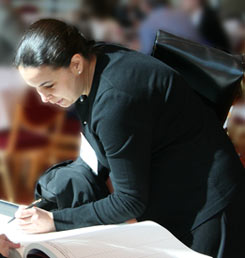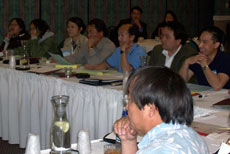 Wisconsin Lawyer
Wisconsin Lawyer
Vol. 79, No. 5, May 2006
 Legal News & Trends
Legal News & Trends
State Bar welcomes new members
54 lawyers attend swearing in
Fifty-four lawyers who passed the Wisconsin bar exam were admitted to
practice in Wisconsin on April 18. Surrounded by family and friends, the
lawyers were welcomed by members of the Wisconsin Supreme Court, State
Bar President D. Michael Guerin, and the Board of Bar Examiners (BBE)
board chair, the Hon. Charles Constantine.

Diana Smiroldo
Goodman signs the supreme court roll that has been signed by every
lawyer admitted to practice in Wisconsin since the state was a
territory.
Justices David T. Prosser, Patience D. Roggensack, and Louis B.
Butler administered the oath in the supreme court hearing room during
three ceremonies throughout the day.
Chief Justice Shirley S. Abrahamson reminded each group that as
lawyers they have a responsibility to be courageous. "Celebrating and
protecting our freedom and democracy is a task for all of us. Courage is
a mindset and an approach to life. Courage is the price life demands for
being at peace with yourself. I ask each of you as a member of the
Wisconsin legal community to use your courage and legal training to make
a difference in society. Look beyond the everyday work you do and find
other ways to serve your community," she said.
Following the swearing-in ceremonies, the lawyers attended a
reception hosted by the State Bar at the Madison Concourse Hotel. During
the reception, each newly sworn attorney signed the supreme court roll
that has been signed by every lawyer admitted to practice in Wisconsin
since the state was a territory.
Of the 124 individuals representing 24 jurisdictions nationwide who
took the bar exam, 87 passed. The State Bar also welcomes the 33 lawyers
who did not attend the April swearing-in ceremonies. This brings
membership to 21,976. The U.W. and Marquette 2006 law school classes'
swearing-in ceremonies will be held in May and June.
This month's practice management tip
Return receipts for
emails
Many lawyers never use return receipts for emails because they
generally are not that useful as evidence in court. But when you are
emailing important, time-sensitive documents to clients or other
lawyers, it is often helpful for you to know they received the document.
Spam filters are one of many reasons an email may not be received, but
no "bounce message" is returned to you to let you know the message was
not received. Use the return receipt option to show your clients or
other lawyers that you care that they receive a document, and save
yourself the aggravation of calling to see if they got your email. In
most Microsoft Outlook versions, return receipt is located under View
and Options. Return receipt also can be located using the Help files if
you use a different email provider.
Visit www.wisbar.org/lomap for more practice
management tips. For
practice management guidance, contact Law Office Assistance Program
Advisor Nerino Petro at PracticeHelp@wisbar.org, (608)
250-6012, or (800) 444-9404, ext. 6012.
Wisconsin courts
publish nation's first Hmong legal glossary
The Wisconsin Director of State Courts Office has published the first
Hmong-English legal glossary in the United States. It defines more than
800 common court terms and suggests equivalent Hmong phrases for many of
them. "The glossary will be useful to the courts, law enforcement,
social services, researchers, teachers, and state government -
particularly in Wisconsin, Minnesota, and California where there are
large Hmong communities - as a resource for interpreting legal
proceedings and for translating government forms into Hmong," says
Marcia Vandercook, senior policy analyst, Office of Court
Operations.

Twenty-five participants attended training for Hmong translators in
April.
"The glossary defines general court terms and specific terms for
criminal, juvenile, family, eviction, small claims, probate, and
deportation cases," says Vandercook. "The equivalent Hmong phrases will
help court interpreters develop common usages and attain the speed
necessary for simultaneous interpretation. The glossary also will be
used by court interpreter programs in Wisconsin and Minnesota for
training Hmong interpreters and helping them prepare for the oral
certification exam."
The glossary has been translated into White Hmong as the predominant
dialect in America. The court recognizes that there may be other
acceptable equivalent terms available from Green/Blue Hmong, Lao, and
regional dialects.
The glossary grows out of a collaboration of the Wisconsin and
Minnesota courts, the Minnesota Translation Lab (Dr. Laurence H.
Bogoslaw, director), the Marathon County Bar Association, the Southeast
Asian Outreach Committee, and Hmong contributors from Minnesota and
Wisconsin. The interpreting was funded by a grant from the Wisconsin
Department of Workforce Development Bureau of Migrant, Refugee, and
Labor Services. The printing was funded by a grant from the State Bar of
Wisconsin Local Bar Grant Competition.
The 75-page glossary can be downloaded at www.wicourts.gov/services/interpreter/resources.htm.
A limited number of print copies are available. For more information,
contact Vandercook at (608) 266-3121 or marcia.vandercook@wicourts.gov.
Mandatory court form updates:
criminal, general, guardianship, and probate
As of Jan. 19, 2006, the Wisconsin Records Management Committee has
updated and introduced the following forms. Key: New (N)/Revised (R)
Criminal
CR-208 Petition and Stipulation to Waive Appearance and Hearing
(R)
CR-244 Order for Presentence Investigation Report (R)
General
GF-142 Arrest - Bench Warrant/Capias (R)
Guardianship
GN-2016 Order Appointing GAL (R)
GN-2017 Annual Report of Guardian ad Litem (R)
GN-2018 Summary Hearing Findings and Order Continuing Protective
Placement (R)
GN-2023 Annual Report of Guardian (R)|
GN-2024 Account of Guardian/Conservator (R)
GN-2051 Transfer of Placement and Notice of Transfer
by GAL/Placement Facility (N)
GN-2053 Petition on Objections to Transfer (N)
Juvenile
JD-1709 Minutes - Juvenile (R)
Probate
PR-1935 Corporate Trustee's Account (R)
PR-1937 Trustee's Account (R)
Forms and summaries are available in PDF or MS Word format at www.wisbar.org/forms. For more
information, contact Terri Borrud at (608) 266-7143 or terri.borrud@wicourts.gov.
Wisconsin Lawyer
